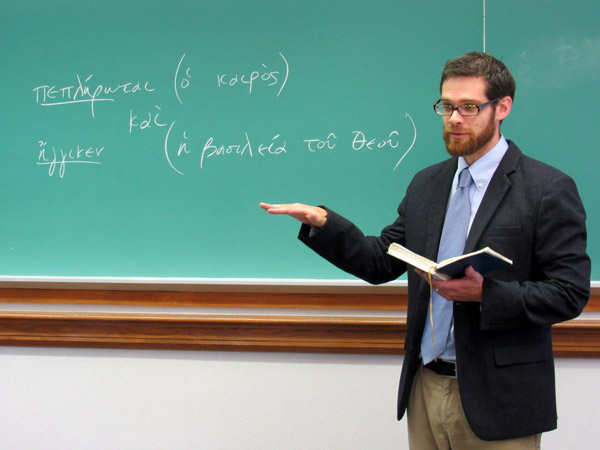The “Inside the PTS Curriculum” series gives you an inside look at what students are learning in their courses at Pittsburgh Theological Seminary. Each article focuses on one class, its subject matter, what students can expect to learn, the required texts, and the kinds of assignments students can expect. We’ll let you know whether the course is required or available for the Master of Divinity (MDiv), the Master of Arts in Pastoral Studies (MAPS), or Master of Theological Studies (MTS). Each article will include the professors’ bio.
This week’s course is: “New Testament Letters and Apocalypse.”
About New Testament Letters and Apocalypse
Pittsburgh Theological Seminary students learn about the letters and apocalyptic literature of the New Testament with Dr. Tucker Ferda in the class “New Testament Letters and Apocalypse.” This course is required for students in the Master of Divinity (MDiv) degree, fulfills a requirement for the Master of Arts in Pastoral Studies (MAPS) degree, and is open to students in the Master of Theology (MTS) degree program.
The course is an introduction to those books of the New Testament associated with the letter-form (the Pauline corpus, Hebrews, the Petrine epistles, Jude, and Revelation), showing their significance in the Church and the world today. Special attention is given to the specific content of these books, to their particular genres, to the life and theology of Paul, and to the methods used in the critical study of these books (literary, socio-historical, rhetoric), as well as to the question of pseudepigraphy.
Students in this course learn about the Jewish setting in the first-century world and the historical setting in the Greco-Roman world. They study the genres of the various epistles and the Apocalypse, plus rhetorical, literary, socio-historical, and ideological criticisms. The class looks at the content of Pauline letters, Hebrews, pastoral and catholic epistles, and Revelation in addition to the life and theology of Paul. Topics include Christology, pneumatology, atonement, eschatology, ecclesiology, tradition, mystery, and pseudepigraphy. Students learn how to read, summarize, and ask critical questions of an article and theological readings of Scripture.
Students complete three cell assignments with discussion, two quizzes (Bible content and course material), and one short paper further exploring one of the previous cell assignments. Reading materials include the New Oxford Annotated Bible with Apocrypha (NRSV); Harper Collins Study Bible with Apocrypha (NRSV); and Exploring the New Testament II: A Guide to the Letters and Revelation by Howard Marshall, Stephen Travis, and Ian Paul.
About the Instructor
Dr. Tucker Ferda began his position as visiting assistant professor of New Testament in 2017 after serving as a lecturer since 2013. He earned his Ph.D. in New Testament from the University of Pittsburgh, where he also served as teaching fellow. In 2015, he was named one of only three Society of Biblical Literature Regional Scholars, an award which “recognizes and promotes outstanding entry-level scholars.” Dr. Ferda has expertise in a wide range of areas in biblical studies, including the Gospels, the life of Jesus, the Old Testament in the New, the history of biblical interpretation, Hellenistic Jewish literature, the Dead Sea Scrolls, and biblical theology.

